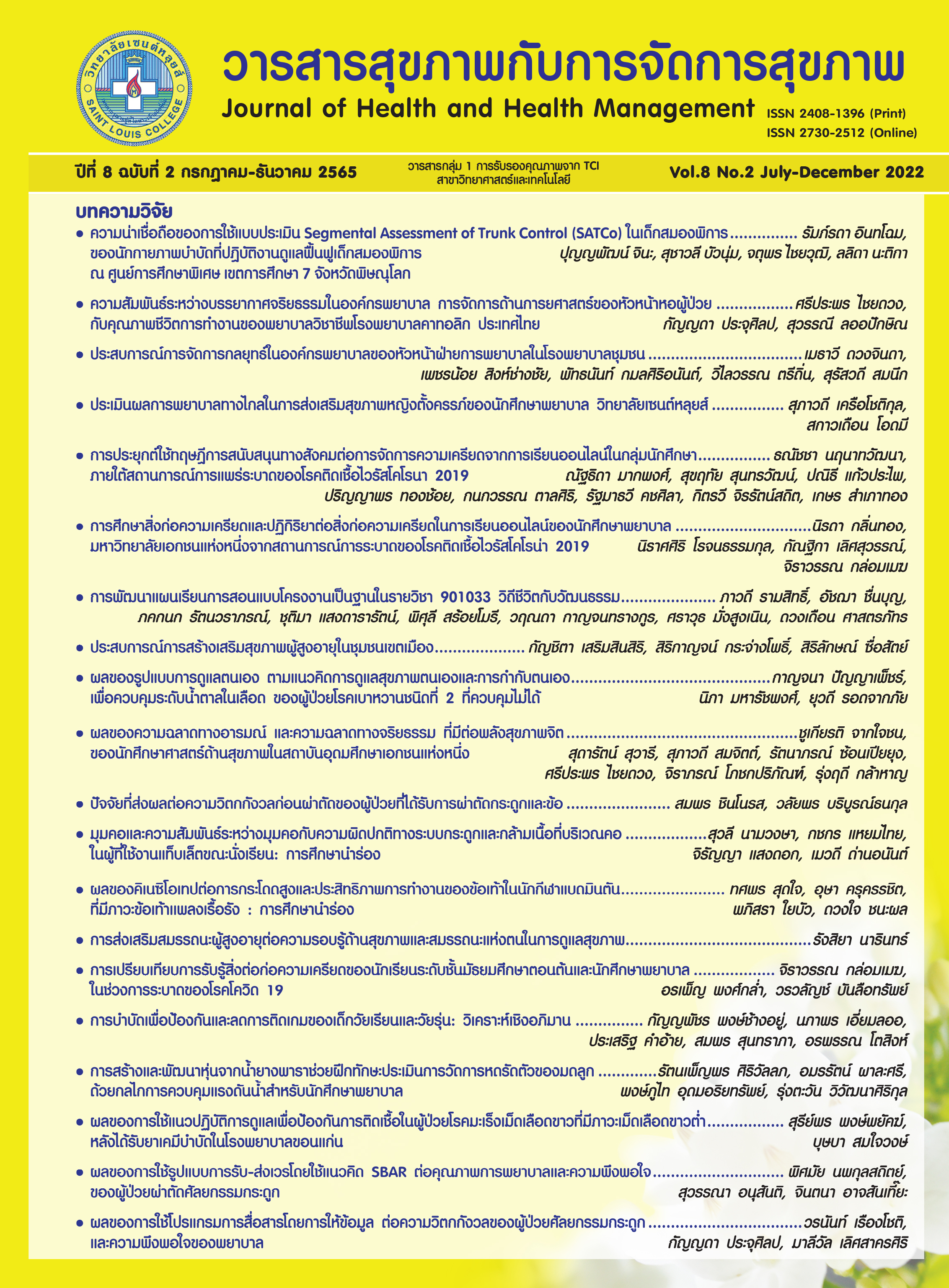Application of social support theory in stress management from online learning among students under the Coronavirus Disease 2019 pandemic
Keywords:
stress, stress management, social support, online learning, coronavirus disease pandemicAbstract
The Coronavirus disease (COVID-19) pandemic, social distancing is one of the strategies that reduce the risk of COVID-19 transmission. The university has responded to this situation by using an online learning process which causes stress problems in students. Their health will be affected especially mental health problems. The application of social support theory is important to manage the stress among students via emotional, assessment, information, and assistance support. These processes will promote students’ health in many ways such as increasing the mental stability, stress coping skills and online learning in the Coronavirus disease (COVID-19) pandemic situation with well-being.
References
กรมควบคุมโรค. (2564). รู้จักโรคติดเชื้อไวรัสโคโรนา 2019. สืบค้นเมื่อ ตุลาคม 20, 2564. จากเว็บไซต์ https://ddc.moph.go.th/viralpneumonia/ind_knowledge.php
กรมควบคุมโรค. (2564). สถานการณ์โรคติดเชื้อไวรัสโคโรนา 2019 (COVID-19) มาตรการสาธารณสุข และปัญหาอุปสรรคการป้องกันควบคุมโรคในผู้เดินทาง. สืบค้นเมื่อ ตุลาคม 20, 2564. จากเว็บไซต์ https://ddc.moph.go.th/uploads/files/2017420210820025238.pdf
กรมควบคุมโรค. (2564). สถานการณ์ผู้ติดเชื้อโควิด-19 ในประเทศ . สืบค้นเมื่อ ตุลาคม 20, 2564. จากเว็บไซต์ https://ddc.moph.go.th/viralpneumonia/.
กรมสุขภาพจิต. (2564). การประเมินสุขภาพจิต. สืบค้นจาก: https://checkin.dmh.go.th/dashboard/index.php.
กรมสุขภาพจิต. (2564). กรมสุขภาพจิต เผยวัยรุ่นไทยปรึกษา “ปัญหาเครียด” มากสุด แนะเทคนิคจัดการความเครียด. สืบค้นเมื่อ ตุลาคม 20, 2564. จากเว็บไซต์ https://www.dmh.go.th/news-dmh/view.asp?id=30188.
กรรณิการ์ แสนสุภา, เอื้อทิพย์ คงกระพันธ์, อุมาภรณ์ สุขารมณ์, และผกาวรรณ นันทะเสน. (2563). การปรับตัวของนักศึกษาในสถานการณ์โควิด-19. วารสาร มจร มนุษยศาสตร์ปริทรรศน์, 6(2), 83-97.
คณิน จินตราปราโมทย์, และพรชัย สิทธิศรัณย์กุล. (2562). สรีรวิทยาความเครียดจากการทำงานและการแก้ปัญหาเมื่อเผชิญความเครียดในอาชีพแพทย์. วารสารการแพทย์และวิทยาศาสตร์สุขภาพ, 26(2), 112-123.
นพเก้า ฉันทสิริกุล และสุปาณี สนธิรัตน. (2563). ทักษะทางสังคม การสนับสนุนทางสังคม และความรู้สึกโดดเดี่ยวของนิสิตคณะวิศวกรรมศาสตร์ชั้นปีที่ 2 มหาวิทยาลัยเกษตรศาสตร์ วิทยาเขตบางเขน การประชุมนาเสนอผลงานวิจัยระดับบัณฑิตศึกษาครั้งที่ 14. ปทุมธานี: มหาวิทยาลัยรังสิต.
นิธิพันธ์ บุญเพิ่ม. (2553). ความเครียดและการจัดการความเครียดของนักศึกษาวิทยาลัยการแพทย์แผนไทย มหาวิทยาลัยเทคโนโลยีราชมงคลธัญบุรี. (การค้นคว้าอิสระวิทยาศาสตรมหาบัณฑิต สาขาวิชาวิทยาการสังคมและการจัดการระบบสุขภาพ). มหาวิทยาลัยศิลปากร, เพชรบุรี.
บริษัท วรธันย์ เทคโนโลยี จำกัด. (2564). การเรียนการสอนออนไลน์ คือ? สืบค้นจาก: https://www.worathan.co.th/Details/onlinelearning_Und_is_Que_.
ราชบัณฑิตยสภา. (2564). ความเครียด. สืบค้นจาก: https://dictionary.orst.go.th/.
Engel, GL. (1980). The clinical application of the biopsychosocial model. The American journal of psychiatry, 137(5), 535-544.
Hefner, J., & Eisenberg, D. (2009). Social support and mental health among college students. American Journal of Orthopsychiatry, 79(4), 491-499.
House, J. S. (1987). Social support and social structure. Sociological Forum, 2(1), 135-146.
Lazarus, R.S. & Folkman, S. (1984). Stress appraisal and coping. New York : Springer Publishing Company.
Mai, Y., Wu, Y. J., and Huang, Y. (2021). What Type of Social Support Is Important for Student Resilience During COVID-19? A Latent Profile Analysis. Frontiers in psychology, 12, 1-11 https://doi.org/10.3389/fpsyg.2021.646145.
Malik, M. & Javed, S. (2021). Perceived stress among university students in Oman during COVID-19-induced e-learning. Middle East Current Psychiatry, 28(49), 1-8.
Park J, et al. (2013). Clarifying the links between social support and health: Culture, stress, and neuroticism matter. Journal Health Psychology, 18(2), 226-35.
Prasertsong, Ch., Sanghirunruttana, J., & Kladkaew, P. (2021). THE FACTOR RELATED TO STRESS OF ONLINE LEARNING DUE TO THE COVID-19 SITUATION AMONG NURSING STUDENTS. Journal of Somdet Chaopraya Institute of Psychiatry, 15(1), 14–28.
Rashid, S., Fayez, O., Ismail, H., amd Khan, R. F. (2021). Digital social support for undergraduate students during COVID-19: Pivotal support for the digital transformation. Journal of public health research, 10(4), 2148.
Schaefer, C., Coyne, J. C., & Lazarus, R. S. (1981). The health-related functions of social support. Journal of Behavioral Medicine, 4(4), 381-405.
Schneiderman, N., Ironson, G., & Siegel, S. D. (2005). Stress and health: psychological, behavioral, and biological determinants. Annual review of clinical psychology, 1(1), 607–628.
Wright, K. B., Rosenberg, J., Egbert, N., Ploeger, N. A., Bernard, D. R., and King, S. (2013). Communication competence, social support, and depression among college students: a model of facebook and face-to-face support network influence. Journal of health communication, 18(1), 41–57.
Downloads
Published
How to Cite
Issue
Section
License
Copyright (c) 2022 Journal of health and health management

This work is licensed under a Creative Commons Attribution-NonCommercial-NoDerivatives 4.0 International License.




